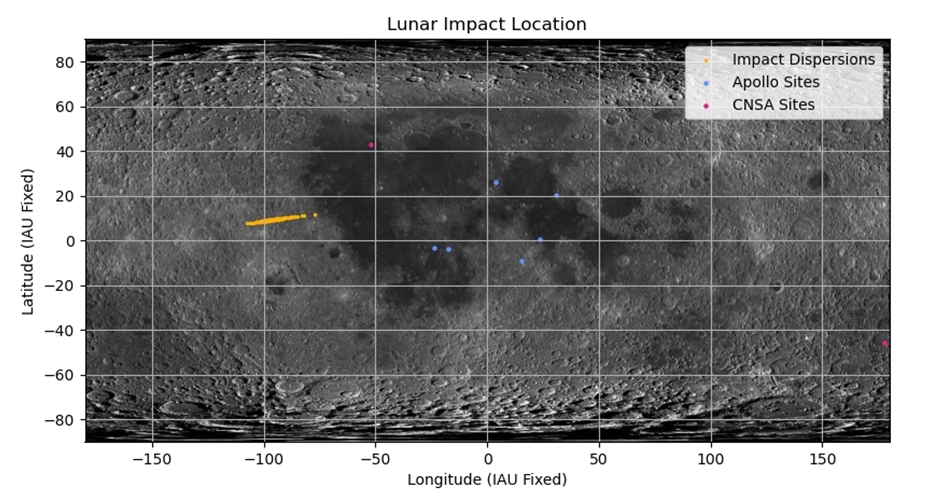A forgotten SpaceX rocket from 2015 is going to hit the moon next month. With a human presence soon to be established on the Moon and in its orbit, managing dangerous space debris is a responsibility we need to prioritize.
A SpaceX Falcon 9 upper-stage rocket first launched in 2015 is going to hit the far side of the moon next month. After delivering the DSCOVR mission to its intended orbit one million miles from Earth, there were few options for the spent rocket. Far from home and with no fuel left, this rocket could not be disposed of in the usual ways. Rockets that deliver missions far from Earth can’t be turned back around, so they are usually jetted even farther away, hopefully never to be seen again. For rockets that finish their mission closer to home, a small bump back toward Earth using the last fumes of fuel is usually enough to tumble them into Earth’s built in incinerator–the atmosphere.
Rockets far from Earth with no fuel left have an unknown future ahead of them. They are left at the mercy of the Solar System’s gravitational forces and could end up virtually anywhere in the Sun-Earth-Moon system–including the lunar surface! A rocket running out of fuel isn’t rare. Just last year a Falcon 9 upper stage was seen breaking up over Portland three weeks after it ran out of fuel and was unable to burn up in the intended way. Next month, the Moon will gain another crater when the three-ton DSCOVR Falcon 9 upper-stage hits the lunar surface at over 5,700 miles per hour. Sounds impressive, but the crater will blend right in with the Moon’s other half a billion craters of the same size. NASA’s Lunar Reconaissance Orbiter will likely take “weeks to months” to identify the new crater, according to NASA.
This is the first time a large piece of space debris will hit the moon, but it will not be the last. As more missions fly similar paths, more rockets will end up stranded with no maneuverability and no clear fate. Many agencies are already working to avoid that outcome by developing rockets like ESA’s Atlas family and SpaceX’s Starship. The Atlas rockets are launched with extra fuel to send them out of the Earth-Moon system after delivering their mission to its intended orbit. The most recent successful mission for the Atlas rocket family was the delivery of the Webb telescope to its orbit of L2 a million miles away. SpaceX’s Starship rockets will be fully reusable and will use reserved fuel to turn around and land back on Earth.

“The upcoming Falcon 9 lunar impact illustrates well the need for a comprehensive regulatory regime in space, not only for the economically crucial orbits around Earth but also applying to the Moon,” says Holger Krag, Head of ESA’s Space Safety Program.
Although this unplanned crash is not a good example of responsible space debris practices, it is a first glance of what is sure to come in the near future. Using the Moon as a trash dump is actually far safer than leaving large debris unattended out in space. (Remember the opening scene in Gravity? That isn’t far from reality.) With NASA’s Artemis program set to return humans to the Moon by 2024 and establish a base camp for long-term stays, public and private interest in the Moon is sure to increase. Many of the rockets delivering these spacecraft will surely meet their fate on the lunar surface. Certain criteria will be ironed out by the space agencies to keep the debris in check, but these rockets are better left as rubble on the surface than dangerous, uncontrollable debris that threaten human missions to the Moon.

I do not know a lot about new space innovations and the orbit in general so I am highly intrigued by your blog. However, I am a firm believer in the potential of Elon Musk and Space X. It is interesting to learn that the Falcon 9 is planned to hit the far end of the moon next month. I wonder why it has taken so long to hit the moon if it was launched seven years ago in 2015. In addition, I wonder what the affect of the large amount of space debris from this rocket will be on our environment and global warming.
This is super interesting to learn more about. A part that sparked me was “Using the Moon as a trash dump is actually far safer than leaving large debris unattended out in space.” Coming from an outsider perspective I at first glance had to re-read this statement. For the mission of these places to eventually make moon a new home, I can see how this can be safer. It is safer to have the debris on the moon than interferring with transporting people. I am not entirely sure how I feel about “moving to the moon” people, but I do love space movies.
Rockets with missions far away from the earth are never jetted back since Falcon 9 did not have enough fuel left to be disposed of normally. The rockets running out of fuel being left in space can land anywhere, and the moon is turning out to be a dumping site. This is raising more concerns as space travel to the moon increases. Launching rockets with extra fuel will help significantly.
We have returned some very distant missions to Earth! Of course the Apollo missions went to the Moon and returned the astronauts and lunar samples to Earth. Other recent missions have traveled far to collect samples from things like the solar wind of the sun, or the vapor surrounding a commet. These missions have their orbital path designed to return to Earth and optimize fuel. You make a good point that missions that don’t need to return to Earth should be planned with an orbital path and enough fuel to get out of the way of future missions.
Good day I am so excited I found your blog, I really found you by accident,
while I was looking on Aol for something else, Regardless I am
here now and would just like to say many thanks for a remarkable post and a all round enjoyable blog (I also love the
theme/design), I don’t have time to read it all
at the moment but I have book-marked it and
also included your RSS feeds, so when I have time I will be back to read more, Please do keep up the fantastic job.
excellent submit, very informative. I’m wondering why the other experts of this sector do not realize this. You must proceed your writing. I’m sure, you’ve a great readers’ base already!